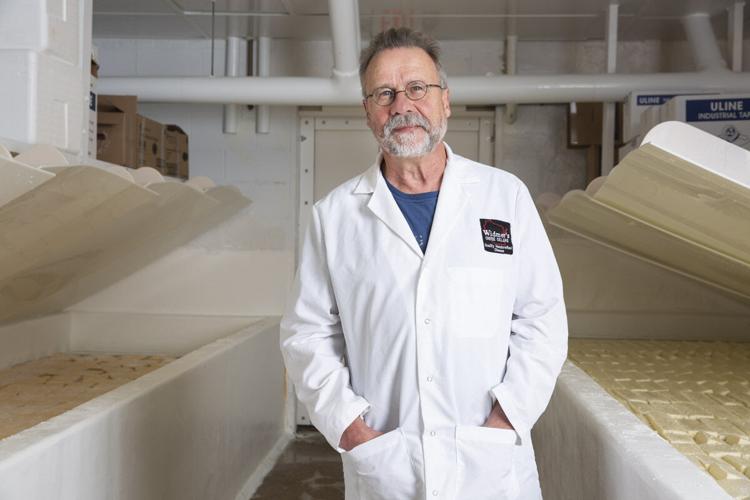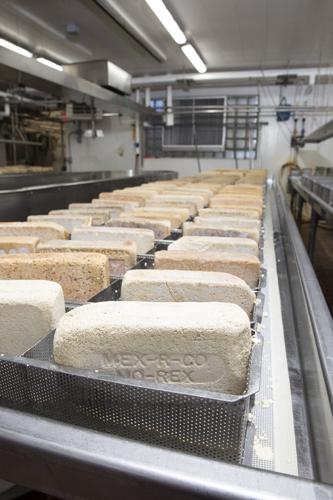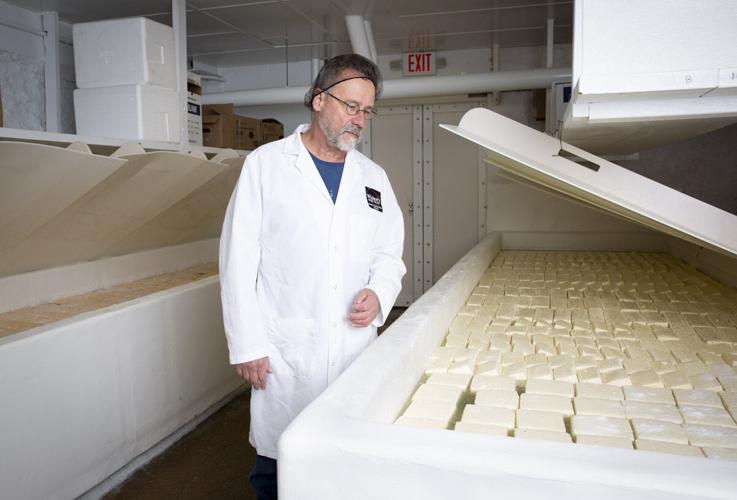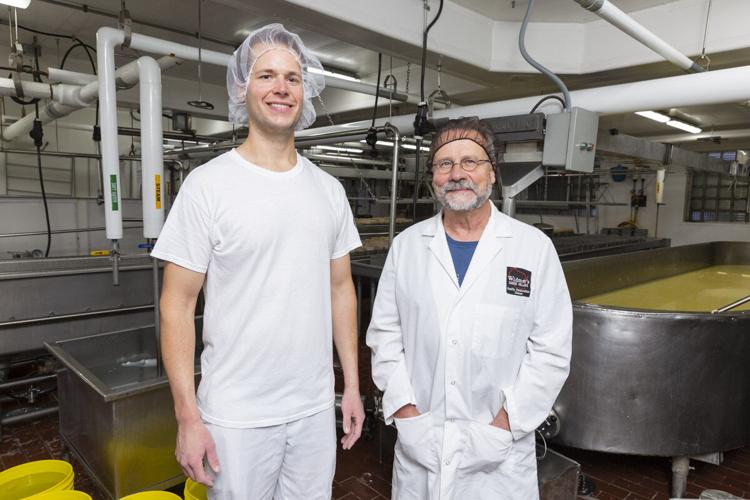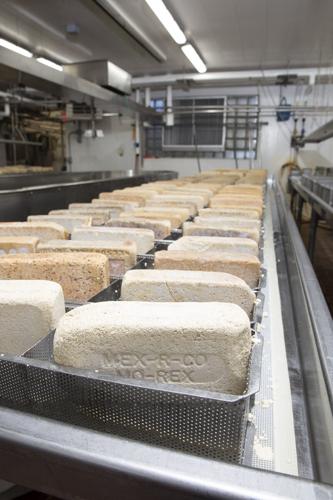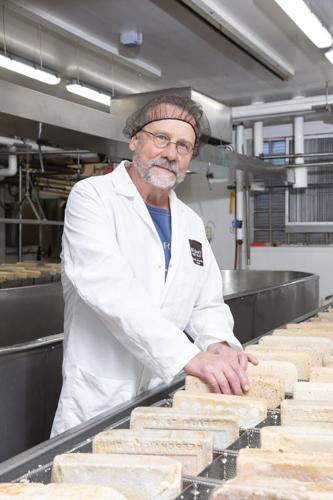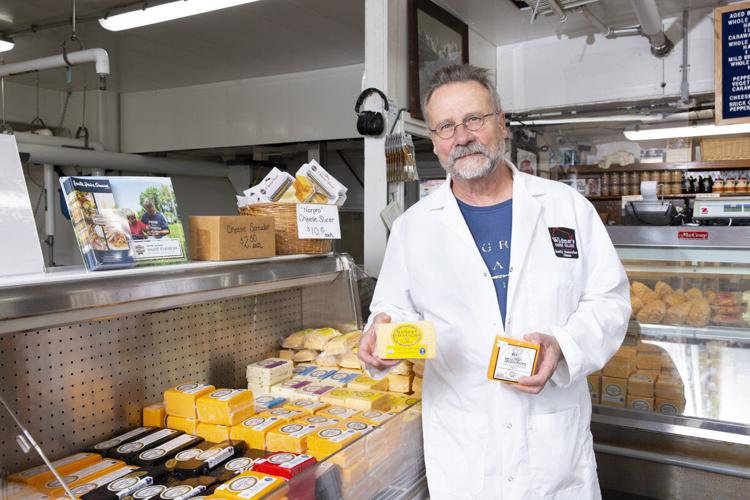
Joe Widmer in the Widmer Cheese Cellars room, where cheese is placed in a brine solution to take on salt and important bacterial cultures.
The tiny burg of Theresa (population: 1,180), located some 20 miles northwest of West Bend, has a hidden gem: Widmer’s Cheese Cellars, which celebrates its centennial this year and has been in the family for four generations.
It’s currently run by Joe Widmer, whose grandfather John purchased the cheese plant in 1922. “John immigrated from Switzerland to America in 1905 at age 18,” Widmer says. “When he immigrated, the local population was heavily German. The market for a cheese such as a surface-ripened brick was strong.”
John and his wife (who joined him in the U.S. in 1909) bought the cheese plant in Theresa. “They built a cheesemaking business using quality milk from local dairy farmers, while raising my father and uncles above the plant,” Widmer says. “My father and uncles ran the company as second-generation business owners. Like my father, I was raised above the plant, and I raised my son Joey onsite, too.”

The real bricks used to press the cheeses, which are the same bricks his grandfather bought decades ago to weigh down the new cheese.
The family tradition continues, as Joe works side-by-side with Joey. “I’m proud to work alongside my son and 22 employees, some who have worked at Widmer’s Cheese since I was in grade school,” he says.
Today, Joe and his team make a wide range of cheeses, including traditional stirred-curd Wisconsin colby, aged cheddar and the classic Wisconsin aged brick. Widmer’s specializes in brick cheese, producing 360,000 pounds of it per year, and the plant’s throwback 20th century techniques provide a solid anchoring point for its quality.
The Widmer’s cheesemaking process is very much in line with its origins. “We still use the same open vats in our 19,000 square-foot facility that my grandfather purchased in 1922 and the same well-worn bricks that he used to press the whey from the cheese in the forms,” Widmer says. “In fact, we’re the only cheesemaker in the country to use real bricks as part of our cheesemaking procedure.”
Yet Widmer’s has kept pace with dairy growth. Marketing, distribution, and even a new logo to reflect its handcrafted, high-quality cheeses have been developed.
Almost 25 years ago, Widmer became one of just a few dozen Wisconsin Master Cheesemakers, “which is basically receiving a Ph.D. in cheese,” he says. The completion of the challenging three-year program (available only to cheesemakers with more than 10 years of experience) allows Widmer to include the “master’s mark” icon on its packaging.
“Wisconsin has 1,200 licensed cheesemakers in the state, but less than 100 hold the distinguished title of master cheesemaker,” Widmer says. “Joey came to work at Widmer’s Cheese nearly eight years ago. He has been a licensed cheesemaker for seven years and plans to participate in the program upon his eligibility.”
New varieties of Widmer cheese include an Alpine cheddar, Matterhorn. “It’s our homestead cheddar with added bacterial cultures that are typically used in cheeses produced in the Swiss Alps,” Widmer explains.
“We’re proud of our rich heritage and have kept many of our recipes the same over the years,” Widmer says. “We’ve made a few tweaks to improve our flavor and product quality. It’s important to remain as authentic as we can — nothing is better than a family recipe.”
For cheese aficionados, Widmer offers a tip: “Those with a more adventurous palate will enjoy our aged brick cheese with a washed rind,” he says. “This cheese carries a bit of an odor because it uses surface ripening bacteria to cure it. When you cut off the rind and eat the inner portion, it’s phenomenal. I’d also recommend our super aged cheddar cheeses, which range in age from 4 to 15 years old.
“It brings me joy to watch people not only eat but enjoy our cheeses. When we receive positive feedback, it validates the countless hours of hard work we put in to carry on our family legacy,” Widmer says. MKE
Cheese facts
• Wisconsin cheesemakers win more national and international awards for their cheeses than any other state or country.
• It takes 10 pounds of milk to make one pound of cheese.
• In addition to supplying your body with calcium and protein, cheese can be a good source of probiotics, which support a healthy gut, because cheese is a fermented food. Two ounces of cheese can provide nearly half of your body’s daily calcium needs.
SEE MORE PHOTOS BY LAURA DIERBECK FROM WIDMER'S CHEESE CELLARS BELOW.
Widmer Cheese Cellars
Master cheesemaker Joe Widmer, third-generation owner of Widmer Cheese Cellars in Theresa, gave us a look at the his cheesemaking operation. He works with his son Joey and more than 20 employees to produce award-winning cheese at the century-old plant.
Widmer is known for its brick cheese, still made on the same forms from the 1920s. The cheese is placed on top of the bricks to squeeze out moisture. Prior to that, it’s soaked and salted in brine tanks, where it is periodically flipped.
Cheese is available in the Widmer retail store, located just above the production facility and offers a birds-eye of view of the process.
Fun fact: Cheese production predates recorded human history, and some historians believe it dates back to 7000 B.C.

